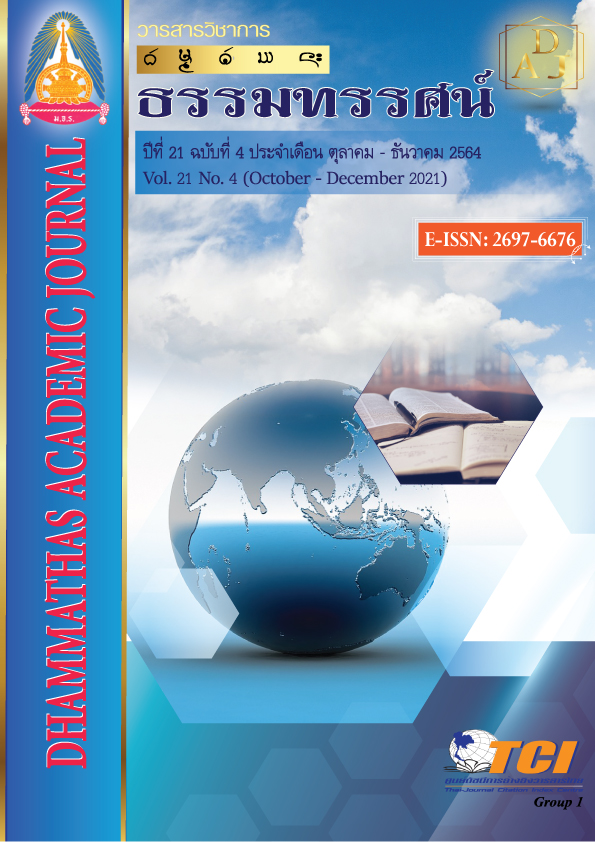An Analysis of Administration of Phuphaman Sub-District Administrative Organization, Phuphaman District, Khon Kaen Province
Main Article Content
Abstract
The objectives of this research were: 1) to study the Four Saṅgahavatthu Dhammas (Bases of Social Solidarity) in Buddhist scriptures; 2) to study the administration based on the Four Saṅgahavatthu Dhammas in Phu Pha Man Sub district Administrative Organization, Phu Pha Man District, Khon Kaen Province; 3) to analyze the administration based on the Four Saṅgahavatthu Dhammas in Phu Pha Man Sub district Administrative Organization. The study was carried out by means qualitative research with 25 person. The data collection was conducted from studying documents and in-depth interviews.
The results of the research were as follows:
1. The Four Saṅgahavatthu Dhammas in Buddhist scriptures includes Dāna (giving, sacrifice, generosity, sharing), Piyavācā (sweet, soft, beautiful, kindly speech), Atthacariyā (useful conduct) and Samānattatā (equality consisting in impartiality). These four virtues are a means of holding each other in the world.
2. The administration based on the Four Saṅgahavatthu Dhammas in Phu Pha Man Sub district Administrative Organization: the strength of management has been integrated with Dāna, the use of the principle of Piyavācā to solve the problem of lack of humility by speaking with beautiful words, the use of the principle of Atthacariyā to solve the problem of lack of self-sacrifice by helping for the benefit of others and the use of Samānattatā to solve problems of punctuality and conflict by being appropriate.
3. The analysis of the administration based on the Four Saṅgahavatthu Dhammas in Phu Pha Man Sub district Administrative Organization: The management of people, money, materials and general management are conducted based on the Four Saṅgahavatthu Dhammas. The management which will achieve the goals requires qualified personnel with sufficient quantity. There must be sufficient funds to support the operations and materials suitable for the needs of the plan and a good management system efficient to use limited resources for maximum benefit.
Article Details
References
โกวิทย์ พวงงาม. (2552). การปกครองท้องถิ่นไทยหลักการและมิติใหม่ในอนาคต. กรุงเทพฯ: วิญญูชน.
ไชยวัฒน์ ค้ำชู. (2545). ธรรมาภิบาลการบริหารการปกครองที่โปร่งใสด้วยจริยธรรม. กรุงเทพฯ: น้ำฝน.
ธิดารัตน์ ศิละวรรณโณ. (2555). ความคิดเห็นของพนักงานส่วนตําบลต่อการบริหารงานขององค์การบริหาร ส่วนตําบลตามหลักสังคหวัตถุ 4 กรณีศึกษาอำเภอแม่สะเรียง จังหวัดแม่ฮ่องสอน. (วิทยานิพนธ์พุทธศาสตรมหาบัณฑิต). พระนครศรีอยุธยา: มหาวิทยาลัยมหาจุฬาลงกรณราชวิทยาลัย.
พระครูวินัยธรยิ่งยง ธมมวโร (โหมดศิริ). (2552). ความพึงพอใจของประชาชนต่อการบริหารงานตาม
หลักสังคหวัตถุ 4 ขององค์การบริหารส่วนตําบลบางกะไห อําเภอเมือง จังหวัดฉะเชิงเทรา. (วิทยานิพนธ์พุทธศาสตรมหาบัณฑิต). พระนครศรีอยุธยา: มหาวิทยาลัยมหาจุฬาลงกรณราชวิทยาลัย.
พระธรรมปิฎก (ป.อ. ปยุตโต). (2543). ธรรมนูญชีวิต. กรุงเทพฯ: มหาจุฬาบรรณาคาร.
พระใบฎีกาศราวุฒิ มหาลาโภ (หงส์คำ). (2552). การบริหารงานตามหลักสังคหวัตถุ 4 ขององค์การบริหารส่วนตําบลในเขตอําเภอคอนสวรรค์ จังหวัดชัยภูมิ. (วิทยานิพนธ์พุทธศาสตรมหาบัณฑิต). พระนครศรีอยุธยา: มหาวิทยาลัยมหาจุฬาลงกรณราชวิทยาลัย.
พระมหาชัยณรงค์ ญาณกิตติ. (2553). ภาวะผู้นําด้านมนุษย์สัมพันธ์ของผู้บริหาร โรงเรียนมัธยมศึกษาตามหลักสังคหวัตถุ 4. (วิทยานิพนธ์พุทธศาสตรมหาบัณฑิต). พระนครศรีอยุธยา: มหาวิทยาลัยมหาจุฬาลงกรณราชวิทยาลัย.
มหาวิทยาลัยมหาจุฬาลงกรณราชวิทยาลัย. (2539). พระไตรปิฎกฉบับภาษาไทย ฉบับมหาจุฬาลงกรณราชวิทยาลัย. กรุงเทพฯ: มหาจุฬาลงกรณราชวิทยาลัย.
สํานักฝึกอบรมเผยแพร่และประชาสัมพันธ์สถาบันพระปกเกล้า. (2541). รัฐธรรมนูญแห่งราชอาณาจักรไทย. กรุงเทพฯ: คณะรัฐมนตรีและราชกิจจานุเบกษา.

